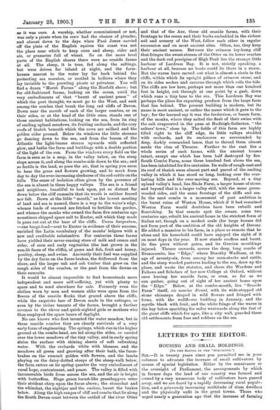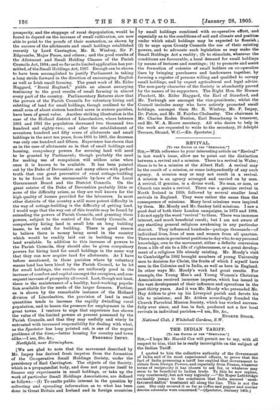[To TIM EDITOR OF THU "SrscrATon. - ] SIE,—It is twenty years
since you permitted me in your columns to advocate the increase of small cultivators by means of special legislation. Either by the connivance or the oversight of Parliament, the arrangements by which in former days the land of our country was farmed and owned by a very numerous body of cultivators have passed away, and we are faced by a rapidly decreasing rural popula- tion, and a grievously increasing multitude of slum dwellers and the physically unfit in the great towns. Those who urged nearly a generation ago that the increase of farming prosperity, and the stoppage of rural- depopulation, would be found to depend on the increase of small cultivation, are now able to point to the proofs of their contention, as shown by the success of the allotments and small holdings established recently by Lord Carrington, Mr. 11.. Winfrey, Sir P. Edgcumbe, Major Poore, and others ; and the good results of the Allotment and Small Holding Clauses of the Parish Councils Act, 1894; and so far as its limited application has per- mitted, of the Small Holdings Act, 1887. Enough can be shown to have been accomplished to justify Parliament in taking long stride forward in the direction of encouraging English as well as Irish small farming. The great work of Mr. Rider Haggard, " Rural England," yields an almost unvarying testimony to the good results of small farming' in almost every part of the country. Parliamentary Returns show that the powers of the. Parish Councils for voluntary hiring and, reletting of land for small holdings, though confined to the small area of about sixteen hundred acres in sixteen parishes, have been of great value. Another striking illustration is the case of the Holland district of Lincolnshire, where between 1881 and 1891 the population decreased two thousand two hundred and eighty-two ; and after the establishment of seventeen hundred and fifty acres of allotments and small holdings in the next ten years, from 1891 to 1901, the decrease was only one hundred and fifteen. Experience has shown that as in the case of allotments so in that of small holdings and housing, compulsory powers for securing land will need , to be granted by Parliament; though probably the need for making use of compulsion will seldom arise when once it is known to be available. It has been pointed out by the Duke of Devonshire and many others with perfect truth that one great preventive of rural cottage-building is to be found in the unreasonable by-laws of the Local Government Board and the District Councils. On the great estates of the Duke of Devonshire probably little or none of the difficulty arises, as they are well known for the high quality of houses provided for the labourers. In most other districts of the country a still more potent difficulty in the way,of cottage-building is the difficulty of getting land. I would urge that the way out of this trouble may be found by extending the powers of Parish Councils, and granting them powers, subject to the control of the County Councils, of compulsorily hiring land in small lots on long building leases, to be relet for building. There is good reason to believe there is money being saved in the country which would be readily laid out in building were the land available. In addition to this increase of powers to the Parish Councils, they should also be given compulsory powers for hiring land for small holdings in the same way that they can now acquire land for allotments. As I have before mentioned, in those parishes where by voluntary means land has been hired by the Parish Council, to be let for small holdings, the results are uniformly good in the increase of comfort and capital amongst the occupiers, and con- sequent increase of prosperity all round. Last, though not least, there is the maintenance of a healthy, hard-working popula- tion available for the needs of the larger farmers. Further, as is shown by the remarkable instance of the Holland division of Lincolnshire, the provision of land in small quantities tends to increase the rapidly dwindling rural population, and to lessen the pressure for employment in the great towns. I venture to urge that experience has shown the value of the limited powers at present possessed by the Parish Councils, and that they may usefully and wisely be entrusted with increased responsibility for dealing with what, as the Spectator has long pointed out, is one of the urgent problems of the time,—better housing for country and town
alike.—I am, Sir, &o., FREDERIC IMPEY. Northfield, near Birmingham.
[We are glad to note that the movement described by Mr. Impey has derived fresh impetus from the formation of the Co-operative Small Holdings Society, under the presidency of Earl Carrington. The objects of the Society, which is a propagandist body, and does not purpose itself to finance any experiments in small holdings, or take up the work of particular Small Holdings Associations, are defined as follows :—(I) To excite public interest in the question by collecting and spreading information as to what has been done in Great Britain and Ireland and in foreign countries by small holdings combined with co-operative effort, and especially as to the conditions of soil and climate and position under which small holdings may be expected to flourish; (2) to urge upon County Councils the use of their existing powers, and to advocate such legislation as may make the Small Holdings Act a reality.; (3) to stimulate, wherever the conditions are favourable, a local demand for small holdings by means of lectures and meetings; (4) to promote and assist the formation of colonies of small holders on co-operatire lines by bringing purchasers and landowners together, by forming a register of persons willing and qualified to occupy small holdings, and by expert agricultural and legal advice. The non-party character of the Society is abundantly proved by the names of its supporters. The Right Hon. Sir. Horace Plunkett, Mr. Rider Haggard, the Earl of Stamford, and Mr. Yerburgh are amongst the vice-presidents ; whilst the Council includes many. who have actively promoted small holdings, amongst them Mr.' R. Winfrey, Mr. F. Impey, Dr. Paton, and Mr. H. Fairfax-Cholmeley. The chairman is Mr. Charles Roden Buxton, Earl Beauchamp is treasurer, and Mr. W. A. Moore secretary. All who desire to help in the work are requested to write to the secretary, 10 Adelphi Terrace, Strand, W.C.—En. Spectator.]























































 Previous page
Previous page